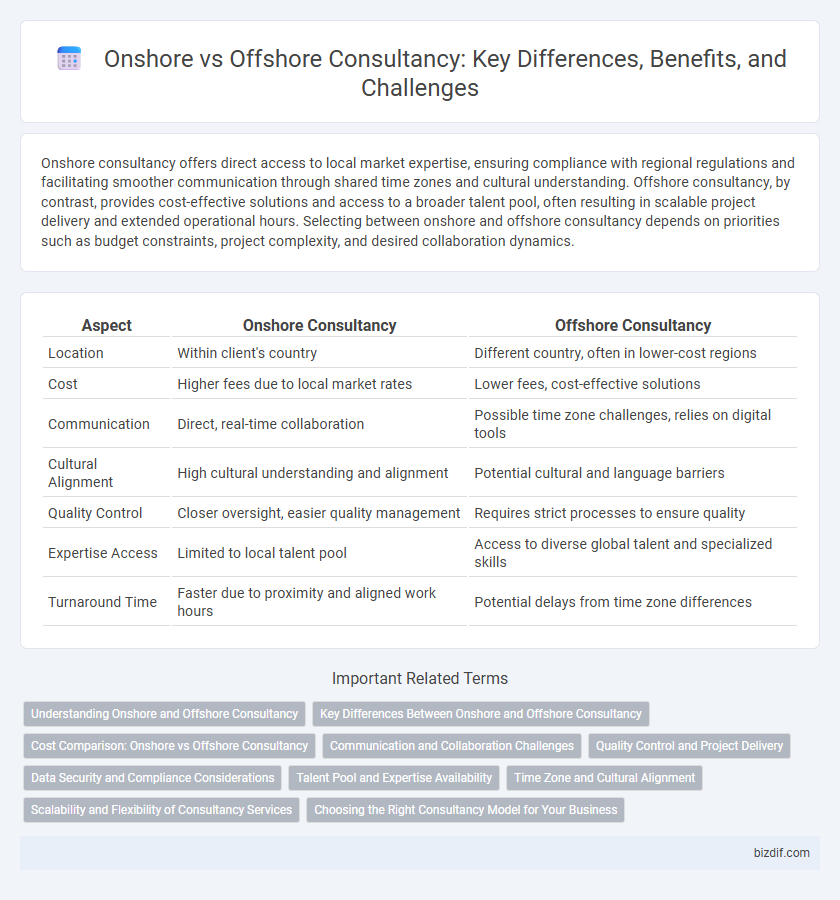Onshore consultancy offers direct access to local market expertise, ensuring compliance with regional regulations and facilitating smoother communication through shared time zones and cultural understanding. Offshore consultancy, by contrast, provides cost-effective solutions and access to a broader talent pool, often resulting in scalable project delivery and extended operational hours. Selecting between onshore and offshore consultancy depends on priorities such as budget constraints, project complexity, and desired collaboration dynamics.
Table of Comparison
| Aspect | Onshore Consultancy | Offshore Consultancy |
|---|---|---|
| Location | Within client's country | Different country, often in lower-cost regions |
| Cost | Higher fees due to local market rates | Lower fees, cost-effective solutions |
| Communication | Direct, real-time collaboration | Possible time zone challenges, relies on digital tools |
| Cultural Alignment | High cultural understanding and alignment | Potential cultural and language barriers |
| Quality Control | Closer oversight, easier quality management | Requires strict processes to ensure quality |
| Expertise Access | Limited to local talent pool | Access to diverse global talent and specialized skills |
| Turnaround Time | Faster due to proximity and aligned work hours | Potential delays from time zone differences |
Understanding Onshore and Offshore Consultancy
Onshore consultancy involves hiring consultants located within the same country, ensuring better cultural alignment, faster communication, and easier legal compliance. Offshore consultancy refers to outsourcing consultancy services to foreign countries, often providing cost savings and access to specialized skills unavailable locally. Understanding the key differences in time zones, language proficiency, and regulatory environments is crucial for selecting the most effective consultancy model for your business needs.
Key Differences Between Onshore and Offshore Consultancy
Onshore consultancy offers localized expertise with teams operating within the client's country, ensuring seamless communication, cultural alignment, and faster response times. Offshore consultancy leverages cost advantages by utilizing resources in distant countries, often providing specialized skills at lower rates but may face challenges related to time zone differences and language barriers. Key differences include proximity to the client, operational costs, communication efficiency, and adaptability to local market regulations.
Cost Comparison: Onshore vs Offshore Consultancy
Onshore consultancy typically involves higher labor costs due to local wage standards, resulting in increased project expenses compared to offshore consultancy. Offshore consultancy offers significant cost savings by leveraging lower wages in regions such as India or Eastern Europe, though it may incur additional expenses related to communication and project management. Businesses must weigh the direct cost benefits of offshore consultancy against potential hidden costs and quality differences to determine the optimal solution.
Communication and Collaboration Challenges
Onshore consultancy offers direct, real-time communication with minimal language barriers, facilitating seamless collaboration and quicker decision-making processes. Offshore consultancy, while cost-effective, often faces challenges such as time zone differences, cultural misunderstandings, and limited face-to-face interactions that can hinder effective communication and project alignment. Implementing structured communication tools and establishing clear collaboration protocols are essential to mitigate these issues in offshore consultancy engagements.
Quality Control and Project Delivery
Onshore consultancy firms offer enhanced quality control through closer collaboration and immediate oversight, ensuring alignment with client expectations and regulatory standards. Offshore consultancy can reduce project costs but may face challenges in maintaining consistent quality control due to time zone differences and communication barriers. Effective project delivery relies heavily on robust quality assurance processes, where onshore teams typically provide faster issue resolution and tighter integration with client operations.
Data Security and Compliance Considerations
Onshore consultancy ensures enhanced data security by adhering to stringent local regulations such as GDPR and HIPAA, reducing risks associated with data breaches and non-compliance. Offshore consultancy may offer cost advantages but often involves navigating complex cross-border data transfer laws and varying standards for information protection. Choosing an onshore partner helps maintain compliance with regional privacy laws and ensures faster response times for security incidents.
Talent Pool and Expertise Availability
Onshore consultancy offers immediate access to a highly skilled talent pool with deep local market expertise, ensuring better alignment with client business goals and regulatory requirements. Offshore consultancy provides access to a broader global talent pool with diverse specialized skills, often at a lower cost, but may face challenges in communication and time zone coordination. The choice depends on prioritizing proximity and cultural understanding versus access to varied expertise and cost efficiency.
Time Zone and Cultural Alignment
Onshore consultancy offers seamless communication due to shared time zones, enabling real-time collaboration and faster decision-making, which enhances project efficiency. Cultural alignment in onshore teams reduces misunderstandings and fosters stronger client relationships, supporting tailored solutions that match local market needs. Offshore consultancy may present challenges with time zone differences and cultural nuances, potentially impacting responsiveness and requiring robust management strategies to bridge gaps effectively.
Scalability and Flexibility of Consultancy Services
Onshore consultancy offers enhanced scalability through immediate access to local resources and faster communication, facilitating rapid adjustments to project scope. Offshore consultancy provides greater flexibility by leveraging cost-effective global talent pools, allowing businesses to scale services without significant increases in overhead. Selecting between onshore and offshore models depends on the critical balance between proximity-driven responsiveness and cost-efficient resource expansion.
Choosing the Right Consultancy Model for Your Business
Onshore consultancy offers direct communication and cultural alignment by providing local expertise, which enhances project transparency and reduces time zone challenges. Offshore consultancy typically delivers cost savings and access to a larger talent pool, making it suitable for businesses prioritizing budget efficiency and scalability. Selecting the right consultancy model depends on factors such as project complexity, required expertise, budget constraints, and the importance of real-time collaboration.
Onshore consultancy vs Offshore consultancy Infographic

 bizdif.com
bizdif.com